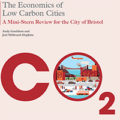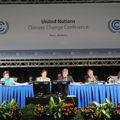The Paris Climate Agreement 2015
At the 2015 United Nations Climate Change Conference (COP21) 195 countries agreed to a new global deal to tackle climate change (PDF). In the lead up to the summit the Centre carried out research on a range of topics that are central to achieving a successful and workable deal.
Unpacking the Paris Agreement: Is it enough to limit dangerous climate change?
Speaker(s): Piers Forster, Andy Gouldson, John Barrett, Harriet Thew
3 Feb 2016 at Conference Auditorium, University of Leeds
This event features a number of experts in the field of climate change science and policy in a panel debate to discuss what the historic Paris agreement means and how we can meet the targets set.
Nicholas Stern responds to publication of the final draft of the Paris Agreement on climate change
Posted 12 Dec 2015 in Press releases
Responding to the publication today (12 December 2015) of the final draft of the Paris Agreement on climate change, Nicholas Stern, Chair of the Grantham Research Institute on Climate Change … read more »
Equity in governance of the UN’s REDD+ programme
Posted 3 Dec 2015 in Announcements
CCCEP’s Dr Monica di Gregorio will co-host a session at the Paris climate talks on Sunday exploring equity in governance of the UN’s REDD+ programme.
New report launched at COP21 bolsters economic and political case for low-carbon urban investment
Posted 1 Dec 2015 in Announcements
A new report published today (December 1) supported by CCCEP and authored by Andy Gouldson and Joel Millward-Hopkins concludes that Bristol – currently European Green Capital – could far exceed its target of reducing carbon emissions by 40 per cent by 2025.
Strengthening non-state climate action: a progress assessment of commitments launched at the 2014 UN Climate Summit
Working paper by Sander Chan, Robert Falkner, Harro van Asselt, Matthew Goldberg on 23 Nov 2015
This report provides the first progress assessment of climate actions launched at the 2014 UN Climate Summit in New York. It considers the distribution and performance of climate actions along … read more »
Intended nationally determined contributions: what are the implications for greenhouse gas emissions in 2030?
Policy publication by Rodney Boyd, Joe Cranston Turner, Bob Ward on 30 Oct 2015
This analysis considers whether the INDCs that were submitted by 23 October 2015 are consistent with a reasonable chance of not exceeding the 2°C warming limit. read more »
The road to Paris and beyond
Policy publication by Rodney Boyd, Nicholas Stern on 31 Aug 2015
This paper shows that effective international cooperation can help the world develop along a 2°C pathway and adapt to the climatic changes already locked-in as a result of past and ongoing greenhouse gas emissions. read more »
Climate negotiations, sustainable development and growth – speech
Presentations and data by Nicholas Stern on 26 Aug 2015
Speech by Nicholas Stern at an event organised by the French government in Paris ahead of the climate change summit. read more »
Tracking intended nationally determined contributions: what are the implications for greenhouse gas emissions in 2030?
Policy publication by Rodney Boyd, Bob Ward on 19 Aug 2015
This paper looks at whether the intended national determined contributions (INDCs) that were submitted by 20 July 2015 are consistent with the 2°C limit. read more »
Nationally Self-Interested Climate Change Mitigation: A Unified Conceptual Framework
Working paper by on 13 Jul 2015
This paper finds that the vast majority of emissions cuts needed to decarbonise the global economy this century can lead to domestic economic benefits that outweigh the costs for individual countries, even before the avoided risks of dangerous climate change are taken into account. read more »
A minilateral solution for global climate change? On bargaining efficiency, club benefits and international legitimacy
Working paper by Robert Falkner on 2 Jul 2015
This paper by Rober Falkner explores the the potential role that climate clubs might play in promoting global climate action. read more »
What will global annual emissions of greenhouse gases be in 2030, and will they be consistent with avoiding global warming of more than 2°C?
Policy publication by Rodney Boyd, Nicholas Stern, Bob Ward on 4 May 2015
Countries agreed at the 20th session of the Conference of the Parties (COP20) in Lima, Peru, in December 2014 to set out their “intended nationally determined contributions” (INDCs) … read more »
Understanding climate finance for the Paris summit in December 2015 in the context of financing for sustainable development for the Addis Ababa conference in July 2015
Policy publication by Nicholas Stern on 23 Mar 2015
Paper asserts that overseas aid to support developing countries should be interwoven with efforts to mitigate and adapt to climate change. It claims that efforts to separate the two could be deeply damaging. read more »
Post-2020 climate agreements in the major economies assessed in the light of global models
Research article by Alex Bowen, Emanuele Campiglio on 16 Dec 2014
Integrated assessment models can help in quantifying the implications of international climate agreements and regional climate action. This paper reviews scenario results from model intercomparison projects to explore different … read more »
Taming the beasts of ‘burden-sharing’: an analysis of equitable mitigation actions and approaches to 2030 mitigation pledges
Policy publication by Alina Averchenkova, Nicholas Stern, Dimitri Zenghelis on 11 Dec 2014
Countries are now seeking to reach a new international agreement on climate change, to be signed in Paris in December 2015. A key element of the international negotiations … read more »
Growth, climate and collaboration: towards agreement in Paris 2015
Policy publication by Nicholas Stern on 8 Dec 2014
Paper explores 4 key elements on which an agreeement at the COP21 – Paris 2015 Climate Change talks could be based read more »
“This time is different”: The prospects for an effective climate agreement in Paris 2015
Policy publication by on 30 Oct 2014
COP21, to be held in Paris at the end of 2015, presents an important opportunity for governments to negotiate a new international climate agreement. A question of central importance to preparations for COP21 is: what sort of policy architecture is most likely to generate sufficiently ambitious action to reduce global emissions? read more »














